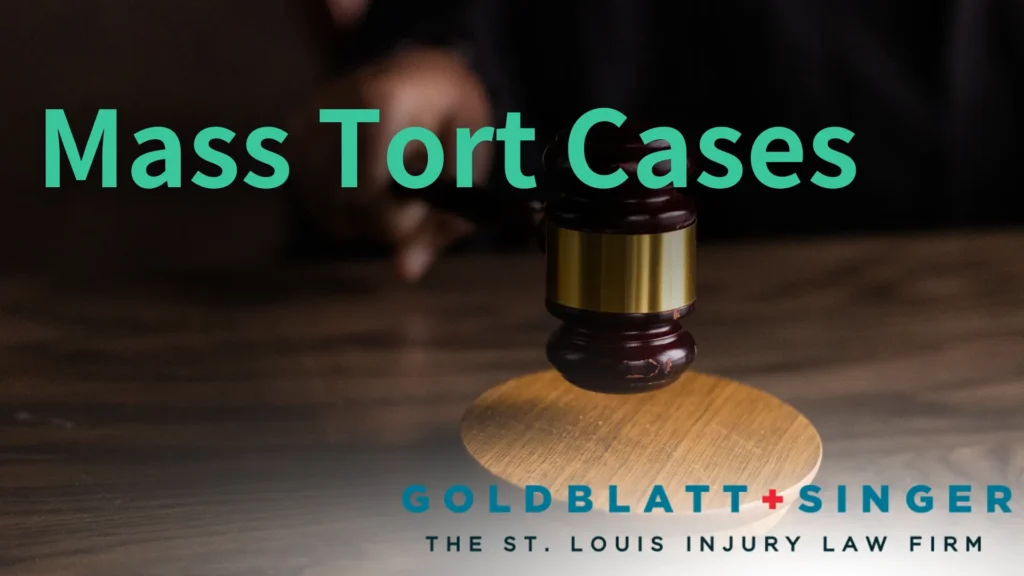
Have you been injured by a defective product, dangerous drug, or environmental hazard? If your situation has also affected numerous others you may be eligible to participate in a mass tort case. Mass tort litigation allows individuals who have suffered similar harm from the same cause to join forces and seek compensation together. Here at Goldblatt + Singer, our mass tort lawyers have extensive experience representing clients and are committed to helping you secure the justice you deserve.
What Is a Mass Tort Case?
A mass tort case involves a situation where a single incident or product has caused harm to a large number of people. These cases differ from class actions in a few key ways. In a mass tort, each plaintiff’s case is considered individually, with evidence presented to demonstrate how they were specifically injured. This allows for a more nuanced evaluation of damages, which can vary depending on the severity of each person’s injury.
Here are some common types of mass tort cases:
- Dangerous Products: Defective medical devices, automobiles, household products, or other consumer goods can cause widespread injuries.
- Pharmaceutical Dangerous Drugs: Prescription drugs with dangerous side effects or drugs marketed deceptively, such as Elmiron.
- Environmental Contamination: Toxic waste exposure, water contamination, or industrial accidents can cause serious health problems for numerous individuals.
- Exposure to Asbestos: Asbestos-related diseases like mesothelioma are a tragic consequence of past negligence, and mass torts can help those affected.
Mass Tort Cases Handled by Goldblatt + Singer
- Elmiron
- Aqueous Film Forming Foam (AFF)
- Camp Lejeune Water Contamination
- Clergy Abuse
- Defective 3M Earplugs
- JUUL e-Cigarette
- Asbestosis
- Mesothelioma
Benefits of Mass Tort Litigation
There are several advantages to pursuing a mass tort claim rather than an individual lawsuit:
- Strength in Numbers: By joining forces with other injured parties, you present a more compelling case to the defendant, increasing your leverage for a fair settlement.
- Shared Resources: Plaintiffs share the costs of litigation, including expert witnesses and scientific testing. This makes it more affordable for everyone involved.
- Streamlined Process: Mass tort cases often utilize Multidistrict Litigation (MDL). This is a system that consolidates pretrial proceedings before a single judge, saving time and resources.
- Experienced Representation: Mass tort litigation requires specialized knowledge and experience. At [Law Firm Name], our attorneys have a proven track record of success in complex mass tort cases.
The Mass Tort Process at [law-firm]
When you come to [law-firm] with a potential mass tort claim, we will take the following steps:
- Case Evaluation: We carefully review your situation to determine if a mass tort case is the course of action for you.
- Investigation: We will conduct a thorough investigation to gather evidence of the harm caused and the responsible party.
- Case Development: We can work with other experienced mass tort attorneys to build a strong case on your behalf.
- Negotiation or Litigation: Initially, we will aggressively pursue a fair settlement through negotiation. However, we will take a case to trial if necessary.
Examples of Successful Mass Tort Cases
Over the years, mass tort litigation has led to significant settlements and verdicts for injured individuals. Here are a few examples:
- Roundup Weedkiller: Mass torts were filed against the manufacturer of Roundup. They alleged a link between the herbicide and non-Hodgkin’s lymphoma.
- Opioid Crisis: Pharmaceutical companies that aggressively marketed opioids while downplaying their addictive nature face mass tort litigation.
- Talcum Powder: Studies have suggested a link between talcum powder products and ovarian cancer. This link has led to mass tort claims against major manufacturers.
These are just a few examples, and new mass tort cases emerge as new dangers come to light.
Contact Goldblatt + Singer If You Have Been Harmed in St. Louis
If you believe you may have been harmed by a product, drug, or environmental hazard that has also affected others, call (314) 231-4100 or contact us online today. Our mass tort lawyers offer a free consultation to discuss your situation and determine if you are eligible. We understand the physical, emotional, and financial challenges you face. Our legal team commits to holding negligent parties accountable and helping you recover the compensation you deserve.